Nokia 9 PureView: the world's first quintuple camera smartphone is here!

So, you think 3 or 4 cameras on a phone is a bit excessive? Well, for a while now, we've been hearing that HMD Global is preparing a new Nokia phone with a total of 5 cameras on its back. And it has just been announced! It's called the Nokia 9 PureView and we are taking a closer look at it:
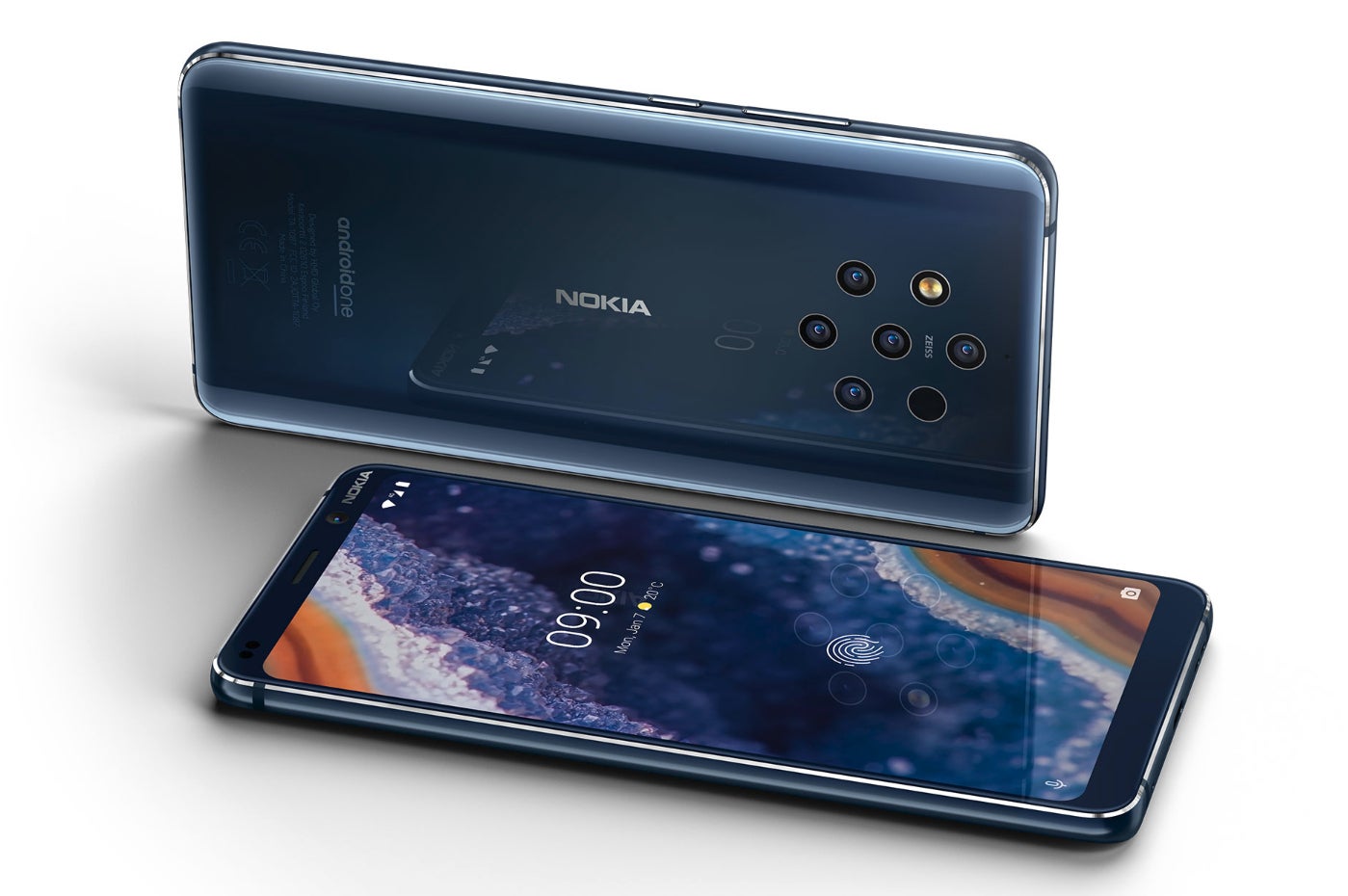
The Nokia 9 PureView stays true to the design language that HMD has been establishing over the past couple of years. A rectangular shape with an elegantly simplistic appearance, an aluminum trim and a glass back, curved towards the edges for a more comfortable grip.
The screen has a 5.99-inch diagonal with an aspect ratio of 18:9. Its resolution is marked as QHD+, which means 1440 x 2880 and it's an OLED panel for deep blacks and vibrant colors.
You will notice that there's no fingerprint scanner to be seen on the phone's body. That's because HMD is utilizing the new under-the-screen fingeprint scanner tech. It's not an ultrasonic one, like on Samsung's Galaxy S10, and we'll have to wait and see how it performs.
Despite the hefty camera module and the 6-inch screen diagonal, the Nokia 9 PureView is actually not that huge of a smartphone. It is easily compared to phones that are easy to handle. Here's a quick size comparison between Nokia 9 PureView, Samsung Galaxy S10 (6.1"), iPhone XR (6.1"), and OnePlus 6T (6.4").
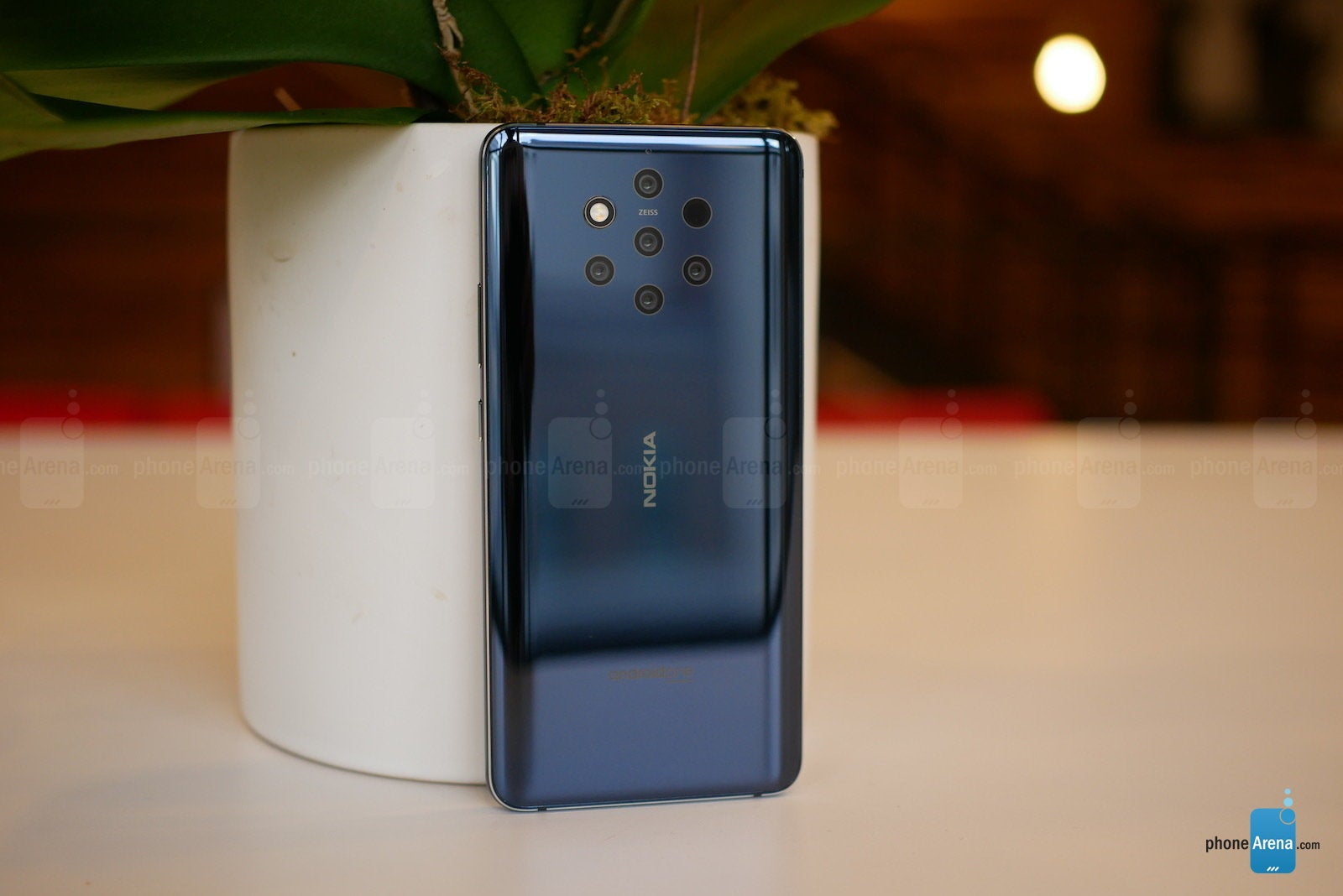
Let's get to the meaty bits — what's up with those cameras? The Nokia 9 PureView has five sensors with ZEISS optics on the back, two of which are RGB and the other three – monochrome. When taking a photo, all sensors work in unison to collect lighting, detail, and color data, and stitch it all together for the final image. According to HMD, taking a single photo results in at least 60 MP of imaging data being processed.
This is made possible with a dedicated image co-processor, which helps out with the heavy task. Every picture is HDR, can have up to 12.4 stops of dynamic range, and ends up with a full scene 12 MP depth map.
Yes, this means that you will be able to use a depth editor to specifically adjust bokeh effects after the photo has already been taken. It'll even allow you to tweak colors and contrast between different depth fields.
And yes, it can shoot RAW.
The Nokia 9 PureView is powered by a Qualcomm Snapdragon 845... yes, that's last year's flagship processor. But hey, that doesn't make it bad, we assume, the choice of hardware here helped with keeping the phone's price in check. According to HMD, making the 5-camera setup with its image processor work in unison with the phone's main processor took a lot of work in partnership with Qualcomm. Launching the PureView wouldn't have been possible now if HMD insisted on developing the same algorithms for the Snapdragon 855.
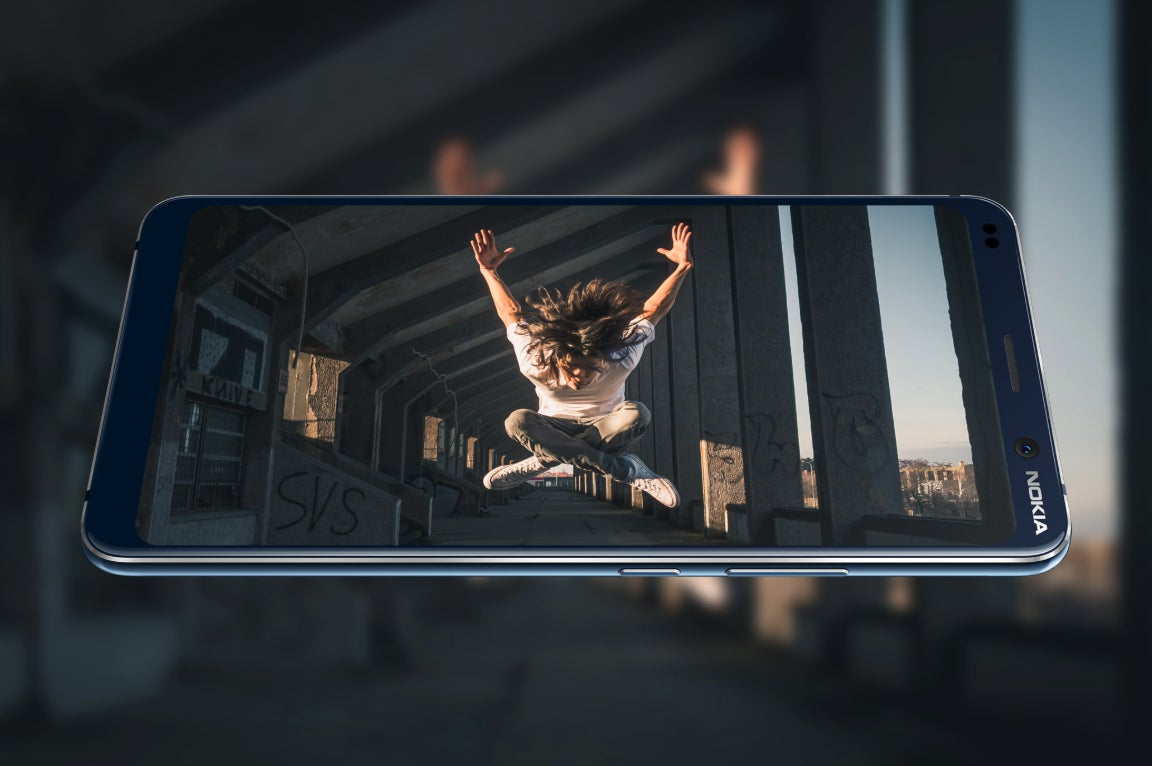
Design and display

The Nokia 9 PureView stays true to the design language that HMD has been establishing over the past couple of years. A rectangular shape with an elegantly simplistic appearance, an aluminum trim and a glass back, curved towards the edges for a more comfortable grip.
You will notice that there's no fingerprint scanner to be seen on the phone's body. That's because HMD is utilizing the new under-the-screen fingeprint scanner tech. It's not an ultrasonic one, like on Samsung's Galaxy S10, and we'll have to wait and see how it performs.
Camera

Let's get to the meaty bits — what's up with those cameras? The Nokia 9 PureView has five sensors with ZEISS optics on the back, two of which are RGB and the other three – monochrome. When taking a photo, all sensors work in unison to collect lighting, detail, and color data, and stitch it all together for the final image. According to HMD, taking a single photo results in at least 60 MP of imaging data being processed.
Yes, this means that you will be able to use a depth editor to specifically adjust bokeh effects after the photo has already been taken. It'll even allow you to tweak colors and contrast between different depth fields.
And yes, it can shoot RAW.
Hardware
The Nokia 9 PureView is powered by a Qualcomm Snapdragon 845... yes, that's last year's flagship processor. But hey, that doesn't make it bad, we assume, the choice of hardware here helped with keeping the phone's price in check. According to HMD, making the 5-camera setup with its image processor work in unison with the phone's main processor took a lot of work in partnership with Qualcomm. Launching the PureView wouldn't have been possible now if HMD insisted on developing the same algorithms for the Snapdragon 855.

That said, it'll still come with 6 GB of RAM and 128 GB of storage, on par with other flagships in the Android space.
The phone is rated for IP 67 water- and dust-resistance and doesn't have a headphone jack. We don't have the battery specs right now, but HMD claims 4G talk time of up to 28 hours and standby time of up to 16.5 days on a single charge.
The phone is rated for IP 67 water- and dust-resistance and doesn't have a headphone jack. We don't have the battery specs right now, but HMD claims 4G talk time of up to 28 hours and standby time of up to 16.5 days on a single charge.
So, how does it fare against the competition? Here is a quick Nokia 9 PureView specs comparison vs the Samsung Galaxy S10 and OnePlus 6T

HMD has partnered with Google for its Nokia phones and they are all now under the Android One umbrella. This means that the Android UI on board is next to untouched, “the way Google meant for it to be” and that the phones will get guaranteed OS updates of at least two years and security patches for three years after launch. Additionally, the updates should be much faster. Thus far, HMD has proven its dedication to the program with its other phones, from entry-level to top-tier.
The Nokia 9 PureView will launch with Android 9 Pie and its nifty new features, like gesture controls, Digital Wellbeing, Adaptive Battery, and so on.
The Nokia 9 PureView will cost you $699, which is a pretty fair price. We get in-screen fingerprint scanner, that juicy new penta-lens camera, and a clean Android experience. Sure, it's powered by a 2018 processor, but if the performance is there and the camera quality is what HMD claims it to be, we'd be willing to look the other way here.
It will be available in March, but you will be able to pre-order yours today!
|
|
|
|
| Nokia 9 PureView | Samsung Galaxy S10 | OnePlus 6T |
| Dimensions | ||
|---|---|---|
| 6.10 x 2.95 x 0.31 inches 155 x 75 x 8 mm |
5.90 x 2.77 x 0.31 inches 149.9 x 70.4 x 7.8 mm |
6.20 x 2.94 x 0.32 inches 157.5 x 74.8 x 8.2 mm |
| Weight | ||
| 6.07 oz / 172.0 g | 5.54 oz / 157.0 g | 6.53 oz / 185.0 g |
| Materials | ||
| Back: Glass (Corning Gorilla Glass 5) Frame: Aluminum | Back: Glass (Corning Gorilla Glass 5) Frame: Aluminum | Back: Glass (Corning Gorilla Glass 5) Frame: Aluminum |
| Resistance | ||
| Water, Dust; IP67 | Water, Dust; IP68 | |
| Biometrics | ||
| 2D Face unlock, Optical in-screen fingerprint | 2D Face unlock, Ultrasonic in-screen fingerprint | 2D Face unlock, Optical in-screen fingerprint |
| Keys | ||
| Right: Volume control, Lock/Unlock key | Left: Volume control, Other; Right: Lock/Unlock key | Left: Volume control; Right: Lock/Unlock key, Other |
| Colors | ||
| Blue | Prism blue, Prism black, Prism white, Prism green, Flamingo pink | Black, Purple |
| Size | ||
|---|---|---|
| 6.0-inch, 79.76% screen-to-body | 6.1-inch, 88.66% screen-to-body | 6.4-inch, 85.77% screen-to-body |
| Type | ||
| P-OLED, HDR | Dynamic AMOLED, HDR | AMOLED |
| Resolution | ||
| 2880x1440px, 18:9 ratio, 538 PPI | 3040x1440px, 19:9 ratio, 550 PPI | 2340x1080px, 19.5:9 ratio, 402 PPI |
| Protection | ||
| Corning Gorilla Glass 5 | Corning Gorilla Glass 6 | Corning Gorilla Glass 6 |
| System chip | ||
|---|---|---|
| Snapdragon 845 SDM845 (10 nm) | Snapdragon 855 (7 nm) | Snapdragon 845 SDM845 (10 nm) |
| Processor | ||
| Octa-core 2800 MHz Kryo 385 | Octa-core Kryo 485 |
Octa-core Kryo 385 |
| GPU | ||
| Adreno 630 | Adreno 640 | Adreno 630 |
| Memory | ||
| 6GB (LPDDR4)/128GB | 8GB (LPDDR4)/128GB 8GB/512GB |
8GB (LPDDR4)/256GB 6GB/128GB 8GB/128GB 10GB/256GB |
| Storage expansion | ||
| microSDXC up to 512 GB | not expandable | |
| OS | ||
| Android (10, 9.0 Pie) | Android (11, 10, 9.0 Pie) | Android (11, 10, 9.0 Pie) |
| Type | ||
|---|---|---|
| 3320 mAh, Li - Polymer | 3400 mAh, Li - Ion | 3700 mAh, Li - Ion |
| Charging | ||
| Qualcomm Quick Charge 3.0, USB Power Delivery Qi and Powermat wireless charging | Qualcomm Quick Charge 2.0, USB Power Delivery, Samsung Adaptive Fast Charging Qi and Powermat wireless charging, Reverse wireless charging |
OnePlus Dash Charge |
| Rear | ||
|---|---|---|
| Penta camera | Triple camera | Dual camera |
| Main camera | ||
| 12 MP (Autofocus) Aperture size: F1.8 Focal length: 28 mm Sensor size: 1/2.8" Pixel size: 1.25 μm |
12 MP (OIS, PDAF) Aperture size: F1.5/F2.4 Focal length: 26 mm Sensor size: 1/2.55" Pixel size: 1.4 μm |
16 MP (OIS, PDAF) Aperture size: F1.7 Focal length: 25 mm Sensor size: 1/2.6" Pixel size: 1.22 μm |
| Second camera | ||
| 12 MP (Autofocus) Aperture size: F1.8 Focal Length: 28 mm Sensor size: 1/2.8" Pixel size: 1.25 μm |
16 MP (Ultra-wide) Aperture size: F2.2 Focal Length: 12 mm Sensor size: 1/3.1" Pixel size: 1 μm | 20 MP (PDAF) Aperture size: F1.7 Focal Length: 25 mm Sensor size: 1/2.8" Pixel size: 1 μm |
| Third camera | ||
| 12 MP (Black and White, Autofocus) Aperture size: F1.8 Focal Length: 28 mm Sensor size: 1/2.8" Pixel size: 1.25 μm |
12 MP (Telephoto, OIS, PDAF) Optical zoom: 2.0x Aperture size: F2.4 Focal Length: 52 mm Sensor size: 1/3.6" Pixel size: 1 μm |
|
| Fourth camera | ||
| 12 MP (Black and White, Autofocus) Aperture size: F1.8 Focal Length: 28 mm Sensor size: 1/2.8" Pixel size: 1.25 μm |
||
| Fifth camera | ||
| 12 MP (Black and White, Autofocus) Aperture size: F1.8 Focal Length: 28 mm Sensor size: 1/2.8" Pixel size: 1.25 μm |
||
| Flash | ||
| Dual LED | LED | Dual LED |
| Video recording | ||
| 4K UHD (30 fps) HDR, Video calling, Video sharing | 4K UHD (60 fps), 1080p (240 fps), 720p (960 fps) HDR, Time-lapse video, Hyperlapse, Picture-taking during video recording, Video light, EIS, Video calling, Video sharing | 4K UHD (60 fps), 1080p (240 fps), 720p (480 fps) EIS, Video calling, Video sharing |
| Front | ||
| 20 MP | 10 MP (Autofocus, HDR) Video capture: 4K UHD |
16 MP (HDR) Video capture: 1080p |
| Bluetooth | ||
|---|---|---|
| 5.0 | 5.0 | 5.0 |
| WLAN | ||
| a,b,g,n,ac,dual-band MIMO, Wi-Fi Direct, Hotspot 802.11 a, b, g, n, ac | a,b,g,n,ac,Wi-Fi 6,dual-band MIMO, Wi-Fi Direct, Hotspot 802.11 a, b, g, n, ac, ax |
a,b,g,n,ac,dual-band MIMO, Wi-Fi Direct, Hotspot 802.11 a, b, g, n, ac |
| USB | ||
| Type-C, USB 3.1 | Type-C, USB 3.1 | Type-C, USB 2.0 |
| Sensors | ||
| Accelerometer, Gyroscope, Compass, Hall (for flip covers), Barometer, Ambient light sensor, Proximity sensor | Accelerometer, Gyroscope, Compass, Hall (for flip covers), Heart rate, Barometer, Ambient light sensor, Proximity sensor | Accelerometer, Gyroscope, Compass, Hall (for flip covers), Ambient light sensor, Proximity sensor |
| Hearing aid compatible | ||
| M4/T4 | M3/T3 | |
| Location | ||
| GPS, A-GPS, Glonass, BeiDou, Cell ID, Wi-Fi positioning | GPS, A-GPS, Glonass, Galileo, BeiDou, Cell ID, Wi-Fi positioning | GPS, A-GPS, Glonass, Galileo, BeiDou |
| Other | ||
| NFC, ANT+, VoIP, Tethering, Computer sync, OTA sync | NFC, ANT+ | NFC, UMA (Wi-Fi Calling), VoIP, Tethering, Computer sync, OTA sync |
| Headphones | ||
|---|---|---|
| No 3.5mm jack | 3.5mm jack | No 3.5mm jack |
| Speakers | ||
| Earpiece, Loudspeaker | Earpiece, Multiple speakers | Earpiece, Loudspeaker |
| Features | ||
| Album art cover, Background playback | 32-Bit DAC, Dolby Atmos, aptX-HD | aptX-HD |
| Screen mirroring | ||
| Wireless screen share | ||
| Additional microphone(s) | ||
| Noise cancellation | ||
| LTE Bands | ||
|---|---|---|
| 1, 2, 3, 4, 5, 7, 8, 20, 28 | 1, 2, 3, 4, 5, 7, 8, 12, 13, 14, 17, 18, 19, 20, 25, 26, 28, 29, 30, 66, 71 | 1, 2, 3, 4, 5, 7, 8, 12, 13, 17, 18, 19, 20, 25, 26, 28, 29, 30, 32, 66, 71 |
| TDD Bands | ||
| 34, 38, 39, 40, 41 | 38, 39, 40, 41, 46 | 34, 38, 39, 40, 41, 46 |
| 3G Bands | ||
| 1, 2, 5, 8 | 1, 2, 4, 5, 8 | 1, 2, 4, 5, 8 |
| Data Speed | ||
| LTE-A Pro Cat 16 (1000/150 Mbit/s), HSDPA+ (4G) 42.2 Mbit/s, HSUPA 5.76 Mbit/s | LTE-A Pro Cat 20 (2000/150 Mbit/s), HSDPA+ (4G) 42.2 Mbit/s, HSUPA 5.76 Mbit/s | LTE-A Pro Cat 16 (1000/150 Mbit/s), HSDPA+ (4G) 42.2 Mbit/s, HSUPA 5.76 Mbit/s, UMTS |
| Dual SIM | ||
| Yes | ||
| SIM type | ||
| Nano SIM | Nano SIM | Nano SIM |
| HD Voice | ||
| Yes | Yes | |
| VoLTE | ||
| Yes | ||
| FCC approval | ||
|---|---|---|
| Date approved: Feb 01, 2019 FCC ID value: A3LSMG973U | Date approved: Oct 30, 2018 FCC ID value: 2ABZ2-A6013 | |
| Measured SAR | ||
| Head: 0.39 W/kg Body: 1.37 W/kg Simultaneous Transmission: 1.59 W/kg Wireless Router: 1.35 W/kg Phablet: 3.99 W/kg |
Head: 1.34 W/kg Body: 1.19 W/kg Simultaneous Transmission: 1.59 W/kg Wireless Router: 1.32 W/kg Phablet: 3.62 W/kg |
|
| Officially announced | ||
|---|---|---|
| Feb 24, 2019 | Feb 20, 2019 | Oct 29, 2018 |
| Prices (MSRP) | ||
| $699 | 8GB/128GB - $900 | 8GB/256GB - $629 |
See the full
Nokia 9 PureView vs Samsung Galaxy S10 vs OnePlus 6T specs comparison
or compare them to other phones using our
Phone Comparison tool
Pure Android experience

HMD has partnered with Google for its Nokia phones and they are all now under the Android One umbrella. This means that the Android UI on board is next to untouched, “the way Google meant for it to be” and that the phones will get guaranteed OS updates of at least two years and security patches for three years after launch. Additionally, the updates should be much faster. Thus far, HMD has proven its dedication to the program with its other phones, from entry-level to top-tier.
Price
The Nokia 9 PureView will cost you $699, which is a pretty fair price. We get in-screen fingerprint scanner, that juicy new penta-lens camera, and a clean Android experience. Sure, it's powered by a 2018 processor, but if the performance is there and the camera quality is what HMD claims it to be, we'd be willing to look the other way here.
It will be available in March, but you will be able to pre-order yours today!
Follow us on Google News

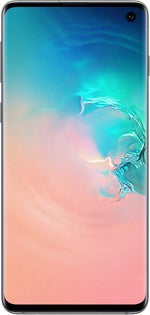








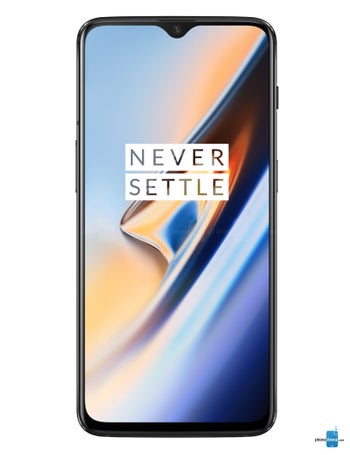






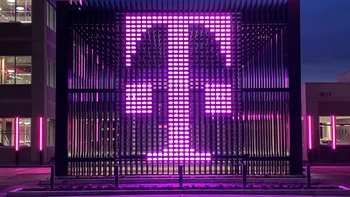






Things that are NOT allowed:
To help keep our community safe and free from spam, we apply temporary limits to newly created accounts: